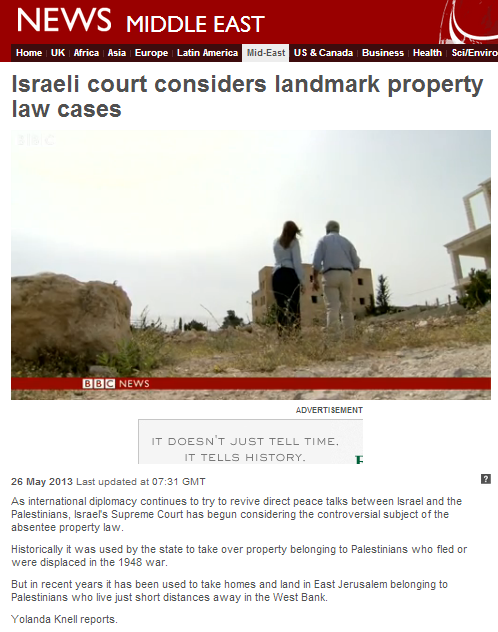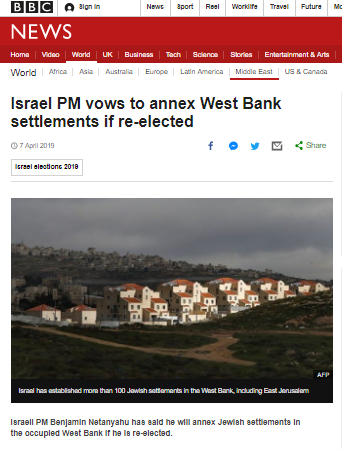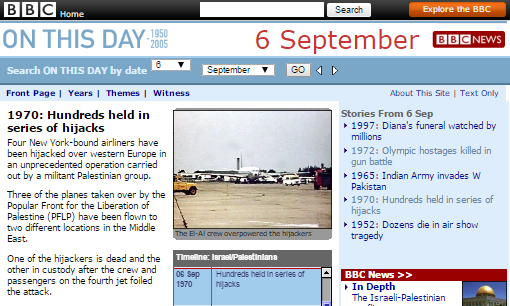The BBC Jerusalem Bureau’s Yolande Knell appears to have launched something of a campaign. On the Middle East page of the BBC News website we find two items by Knell relating to the same subject.
One item is a written article entitled “Israeli court considers landmark property law cases” dated May 22nd 2013, whilst the other is a filmed report with the same title from May 26th 2013 which was broadcast on BBC television news programmes.
Both of Knell’s reports rely heavily upon the emotionally laden testimony of Mr Ali Ayyad. The filmed report opens with Knell saying to Ayyad:
“So this was all of your father’s building from 1954?”
The written report also stresses the same point:
“The large building, erected by his father in 1954, was originally for residential use. It was converted into a hotel in the 1960s, and for many years Mr Ayyad was the manager.
“This is where I met my wife and many of my long-time friends. My daughters came here after they were born. We lived on the third floor. It was not just a home, it was a way of life,” he recalls.”
But one very important factor is overlooked by Knell in her story and that is that history did not begin in 1954 – or indeed in 1948.
Ali Ayyad’s father, Abdel Hadi Ayyad – did indeed build in 1954 the house in Abu Dis which became known as the Cliff Hotel after its extension in 1964. Mr Ayyad senior – who died in 1978 – held Jordanian citizenship (and according to one Palestinian source was an officer in the Jordanian army) and never registered as a resident of Jerusalem after 1967. He has around a dozen heirs, four of whom live in Jordan, three in Kuwait, three in Palestinian Authority controlled areas, one in Norway and one in the United Kingdom.
In the protocol one of the many court cases over the years on the subject of the Cliff Hotel, it is stated that in 2008 the heirs accepted the fact that the building lies within Israeli territory.
Hence, Knell’s claim that “[t]he Israeli authorities now say that his building – which is close to the 1949 armistice line – falls within the boundaries of Jerusalem” [emphasis added] is at best disingenuous. Equally problematic is the fact that Knell suggests to readers that the issue of absenteeism revolves around Ali Ayyad – rather than his deceased father, as is actually the case.
“Since 2003, the owners have faced several further attempts by Israeli authorities to seize the building. They are currently classed as “absentees” and the Custodian of Absentee Property controls the hotel.
“It’s absurd. It’s a subject I keep thinking about. How can the law find somebody absent when he or she very much exists? I have to keep pinching myself to show I’m present,” Mr Ayyad says.”
In this report Knell continues the BBC practice of quoting functionaries from political NGOs without making their affiliations and political motivations clear to audiences.
“There has not been systematic use of the Absentee Property Law but there is sporadic use and as a result there have been contradictory court verdicts. That’s why this is going to the Supreme Court,” says Israeli lawyer Daniel Seidemann.”
Daniel Seidemann is the founder of ‘Terrestrial Jerusalem‘ and ‘Ir Amim‘.
Knell devotes a considerable portion of her written article to the subject of the Israeli Absentee Property Law. Significantly – especially in this case – she makes no effort to inform readers of the fact that during the 19 year Jordanian occupation of Judea, Samaria and parts of Jerusalem (the later annexation of which was not recognized by the international community), there existed a body called the Jordanian Custodian of Enemy Property which was established to handle property seized from Jews during the War of Independence.
“During the war of independence, the mandatory Jordanian legions conquered the area of Judea and Samaria, and in 1950 annexed the area. In the aftermath of the Jordanian occupation of the area, the appointed Jordanian governor published proclamation 55, declaring all residents of Israel as “enemies” of the state. This declaration enabled the application of the Trading with the Enemy Act, 1939, to the property of Israelis in the area.
According to the act, a Jordanian custodian was appointed to manage enemy property including all the “Jewish Lands”. In turn the authorities of the Jordanian Kingdom used the lands for various purposes, including leasing and renting the land to the citizens.”
After the Six Day War and the subsequent end of the Jordanian occupation, property previously administered by the Jordanian Custodian of Enemy Property was transferred to the administration of the Israeli Custodian of Absentee Property, but the fact that the Jordanian authorities had frequently leased or sold Jewish-owned land to Jordanian citizens further complicated the legal situation.
In Abu Dis – as is acknowledged even by Palestinian organisations – some 598 dunams of land are actually Jewish-owned.
During the years 1920-30 the ‘Agudat HaDayarim’ Jewish Cooperative Society was established in Jerusalem in order to establish Jewish neighborhoods outside of the Old City for its members. The Society had over 210 members, from all walks of life and ethnic backgrounds including Persians, Iraqis and Yemenites. In 1928 the Aguda purchased 598 dunams of land in the area known today as Abu Dis – due to its proximity to the city centre – in order to build a ‘Garden Community’ (homes with agricultural plots). Although it acquired a legal title to the area, the Arab revolts of 1929 and 1936-9 prevented the Aguda from establishing the new community.
The War of Independence resulted in the Jewish-owned lands in Abu Dis coming under the control of the Jordanian Custodian of Enemy Property. After the Six Day War and the subsequent reunification of Jerusalem, most of the Jewish-owned land in Abu Dis (some 540 dunams) remained outside of the city’s municipal boundaries and part of modern Abu Dis is built upon that land. Some 60 dunams of the land originally owned by ‘Agudat HaDayarim’ in Abu Dis does fall within Jerusalem’s municipal boundaries.
Of course the BBC (strangely, for an organisation committed to accuracy) does not make a practice of informing its audiences about the subject of Jewish-owned lands in what it terms “the West Bank”, but the Jewish-owned lands in Abu Dis certainly should have been part of Yolande Knell’s research before she elected to co-opt the BBC to Ali Ayyad’s prolific media campaign.







